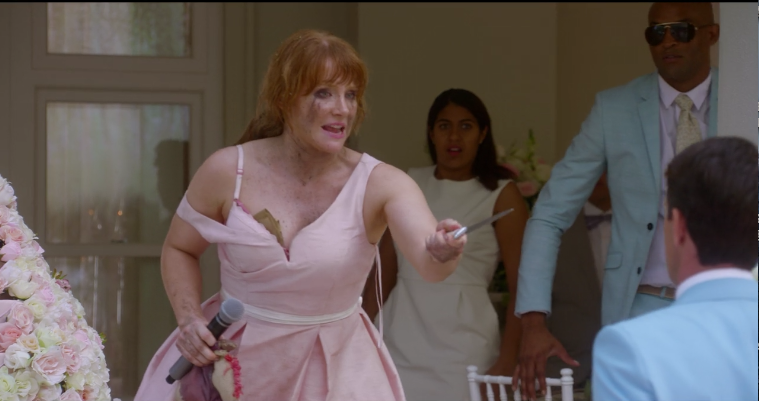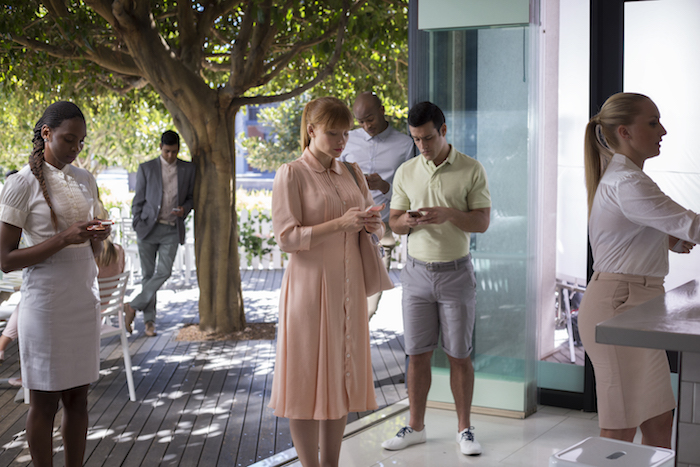A Black Mirror thought experiment – what actually scares you about “Nosedive”
Is the Black Mirror episode “Nosedive” really just about social media? Other analysis suggests that is what makes “Nosedive” terrifying. Yet, I think if you look at it that way, you’re missing the real point of the episode.
Warning: Full spoilers for S3E01 !
The new season of Black Mirror is out, and at least the first episode is as solid as the previous seasons. The episode is called “Nosedive” and it explores a world in which all of our various rating systems are connected together, and an aggregate rating determines just about everything in your life. So your Uber ranking is mixed with the number of “likes” your posts get on Instagram, which is mixed with your credit score, and so on. To top it off, anyone can rate anyone else at any time – politeness is a must. All of this adds up to create a super-powerful “Klout”-like score. That score is useful to get you into country clubs (no one under 3.8/5 “stars” allowed), useful in job interviews, gets you discounts on financing, lets you skip the line at the rental car agency, extended again to everything in society. The episode doesn’t go into it, but you can assume that you start off with a 3.0 when you become 18 years old, or something similar – mirroring how you start of fairly neutral in Uber/Airbnb/etc rankings.
Boiled down to it, in the dystopia portrayed in “Nosedive”: social class, economic class, and your public life have no boundaries. All impact each other, and a mistake in one has ramifications beyond just that sphere.
Everyone in today’s world finds this terrifying. Not least because life has again uncannily mimicked art and a Chinese bureaucrat earnestly proposed this solution for Chinese citizens independently of the show.
But what is it about “Nosedive” that is so terrifying?
I’m going to try a thought experiment. I’m going to compare the two societies, and then play the devil’s advocate and suggest that Black Mirror’s “Nosedive” society may be better than our current one.
In our current society, social class already strongly impacts your economic class. Do you think you could successfully get an offer at your company today if you had an accent that placed you in either “the hood” or “the boonies”? What about prestigious academic positions? Simply being around rich people gives you a leg up as well – see how much effort parents make to move into wealthy school districts, for example.
Similarly, your public life now directly affects both your social and economic class. And increasingly, it does so immediately – see Justine Sacco’s one big mistake on Twitter to see how true that is. Even the incident at the airport could easily be replicated in our own time. Making a poor-taste joke at the airport could send you to jail, which could easily cause you to lose your job. Perhaps you fight back a bit when the police officer tries to detain you – now that felony is now essentially a permanent “minus 1 star” on your record for the rest of your life.
The one part of the “Nosedive” narrative that goes a little farther than our current society is the sad saga of the coworker ostracized due to being on the “wrong side” of a breakup. He eventually loses his job in the process. We still do have a bit more of a public / private life separation, where we would probably not penalize someone so harshly for a simple breakup. Also, for dramatic effect, the cost of a mistake is faster to take hold, and there doesn’t seem to be any leniency for someone who only made a few mistakes.
‘Schimmy, so the society in “Nosedive” is not quite as different from ours as we think. But still, it’s not like we’re being judged by the popular girl from high school in the same way! I don’t live in the same fear that someone might not give me a house because I don’t have enough Instagram followers, or that I might argue with an authority figure when I’m having a bad day and lose my societal freedoms, or that even just a run-in with someone in my local housing community could change my life negatively in a huge way.’
You might say that. And if you did, I’m going to guess you’re not a person of color.
See, the thing that freaks us (I’m speaking as privileged white folks) out about “Nosedive” is not that the person we hated in high school has so much power over us, or we now we have to pay even more attention to Facebook.
What freaks white (privileged, etc) people out about “Nosedive” is that in this dystopia, our privilege and power can easily be stripped away from us with no warning. This would leave us naked in our cold, indifferent, hostile society. The society that we currently can ignore via our Instagram feeds of tapenade and lattes. It’s a darker, updated, more realistic version of Trading Places, and it’s terrifying.
So here’s my experiment. Imagine Lacey, the protagonist in “Nosedive”, making the same choices with the same actions, but in our current society. But imagine that instead of losing stars during the episode, the protagonist loses socio-economic capital. So in the current American socioeconomic-value-system, with every star lost she would:
- Adopt a more “hick” accent / immigrant accent
- Show a darker skin color
- Lose experience in navigating airline and car rental systems
- Gain more items in her “background check” that might disqualify her
- Show more tattoos / clothing that betrayed lower socio-economic status
- Express faith in the “wrong” religions
So when we see Lacie walking around the cars futilely looking for a car charger, we think it’s a dystopian nightmare that no one helps her, even though clearly she’s really a good person down on her luck. However, in our current society, imagine a Hispanic man, with tattoos, with a thick accent asking for a jump for his car at 3 AM in a gas station parking lot. Would you give him the jump? Would your parents?
Similarly, when in the airport, Lacey gets “dinged” harshly for speaking back to authority. It feels unfair, and like something that our society wouldn’t allow. Surely someone should be able to have a bad day once in a while!
But what if someone in our society named “Mohammed” gets just as angry in an airport? Or if you’re a black man having a bad day… and you talk back a bit and resist the police about to “ding” you for trying to make a living?
Finally, think to the last scene. In this scene, Lacey has finally achieved literally zero social capital. She has zero “stars”. All of the party guests have judged her to be a threat and not welcome at the wedding. She picks up a knife, desperate to reach through to the society that has rejected her, searching for some way to make them see who she is and listen to her. Desperate to regain her socioeconomic status, desperate to belong in the country club amongst the wealthy and attractive guests.
The bid fails, and she is gently taken into custody by the private staff of the country club.

Now imagine instead a mentally disabled black man with tattoos and the “wrong” clothes, waving the exact same knife near the high-status bride at the fashionable, wealthy, white wedding he’s crashed.
In our society, that man is shot dead by the cops who respond. Immediately.
Thus my argument is that the “Nosedive” world could be a better world than our current American society. The risks and consequences of screwing up online or in-person on our society are just as high as in “Nosedive”. Social standing is just as influential to your career, to dating, to everything. There are only degrees of difference between the “Nosedive” world and our own world when it comes to how integrated our personas are.
The main difference: in “Nosedive”, everyone starts out with 3 stars, everyone can lose stars equally, and everyone knows the rules. In our society, everyone starts off with wildly different socioeconomic statuses. It’s very difficult to gain or lose “stars”, even amongst generations. And in our society, the higher your status, the more you understand the rules.
It’s a tilted game, but it’s not terrifying to you. Why? Because you, the person reading this on Medium, are likely already above 4 stars. You know how the game is played, and you know you don’t have to worry that what happened to Lacey could happen to you.

So is the scary thing about “Nosedive” that social media might have more power over your work life?
No.
The scary part about “Nosedive” is that it imagines a world in which your privilege is no longer locked in by stable things as race, upbringing, and education. What scares you about the portrayal is the fear that the ladder could be kicked out from under you, and you would have to face the true monster of how society treats those of us who have so few “stars”, who are at the bottom of the socio-economic ladder.
This is what makes Black Mirror‘s “Nosedive” actually terrifying.

One thought on “A Black Mirror thought experiment – what actually scares you about “Nosedive””
Well said and thought provoking.